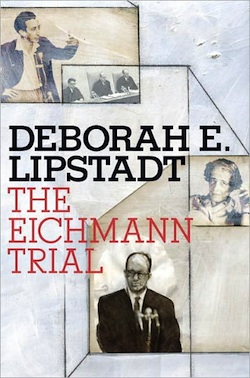By Diana Brement, JTNews Correspondent
Judaism
Imagine: John Lennon and the Jews, A Philosophical Rampage, by Ze’ev Maghen (independent, paper, $12.50). Don’t be put off by the title of this book, it’s about a lot more than John Lennon, although the author uses a critique of the song lyrics as a foundation for his “philosophical rampage.” His “Why be Jewish?” argument has its roots in a long-ago encounter with some Israeli Hare Krishna acolytes at the Los Angeles airport. Maghen — American-born, but now an Israeli professor of Arabic literature and Islamic history at Bar-Ilan University — writes, “the ensuing pages are what I would have said to them,” had he had the time and opportunity.
Maghen is smart (very!), funny, critical, irreverent and lucid, and he puts it all together with equal doses of philosophy, pop culture and religion, and lots of entertaining anecdotes. Where else could you find Star Trek’s Mr. Spock and philosopher Immanuel Kant quoted in the same paragraph? Even if you don’t agree with him (and he delineates at the beginning who should and shouldn’t read this book), it’s a thought-provoking and entertaining ride.
In the Valley of the Shadow: On the Foundations of Religious Belief, by James Kugel (Free Press, cloth, $26). When this preeminent biblical scholar got a cancer diagnosis about 10 years ago, and given only a few years to live, he was not just worried. He writes that “the background music stopped…the music of daily life that’s constantly going, the music of infinite time and possibilities.”
In the face of death, in that silence, and in the passive state of “patienthood,” he thought he discovered clues to the origins of religious belief. Fortunately, Kugel survived to write this book, an exploration of scripture and scholarship, in which he proposes that religion developed in response to the common human existential emptiness and ability to see ourselves as a very small part of a very big world. It’s that “ancient sense of self,” which Kugel felt personally when his “background music” stopped, that led him to explore this phenomenon on a wider scale. Building on the framework of his personal cancer experience, he brings history, neurology, anthropology, poetry and religious writing together to paint a portrait of the development of religion in human society.
God of Me: Imagining God throughout Your Lifetime, by Rabbi David Lyon (Jewish Lights, paper, $16.99). Lyon, in a sense, introduces us to God. This short and sweet book bridges the God-talk gap, helping bring God into our modern, everyday lives. Moving through the different stages of life, he uses Torah to demonstrate the point of each chapter, and concludes with questions for discussion. Parents of teens and young adults may find this book particularly helpful when following the Deuteronomy’s injunction to “teach them to your children to discuss them,” especially while their kids are at the stage of questioning their beliefs or challenging their parents’ beliefs or instructions.
Holocaust
The Eichmann Trial, by Deborah E. Lipstadt (Schocken-Nextbook, cloth, $24.95). The award-winning historian presents a readable and fascinating reevaluation of the groundbreaking trial that became a touchstone for judicial proceedings worldwide in which victims of genocide confront their perpetrators. Beginning with the capture of SS Lieutenant Colonel Adolf Eichmann by Israeli agents in Argentina in 1960, Lipstadt moves on to describe his televised Tel Aviv trial, which riveted the world. Lipstadt was a leader in bringing Holocaust survivors to talk publicly about their experiences and focuses on the dramatic effect that survivor testimony had in that court of law, testimony that itself was not without controversy. In a world that had not really understood the personal stories of the millions who died and the hundreds of thousands who survived, the trial meant, writes Lipstadt, “the story of the Holocaust…was heard anew… The telling may not have been entirely new, but the hearing was” (author’s emphasis).
Non-Fiction
Better by Mistake: The Unexpected Benefits of Being Wrong, by Alina Tugend (Riverhead, cloth, $25.95). We are all wrong on occasion, and we all make mistakes, so why is it so hard to admit them? The New York Times columnist tells us that a piece she wrote about making mistakes became one of the Times’ “most e-mailed” articles, and the responses filled the author’s inbox with readers’ stories about their own mistakes. Tugend explores how we make mistakes, usually cover them up, and how we should really go about handling them as parents, as spouses, as students, as doctors, but most especially in the wake of the financial collapse of 2008, as business people. There’s a downside to striving for perfection, and rewards in acknowledging and embracing the imperfection in all of us.
Gender Studies
Balancing on the Mechitza: Transgender in the Jewish Community, edited by Noach Dzmura (North Atlantic Books, paper, $16.95). This fairly radical topic covers issues of gender identity, religious teaching and observance in Judaism. Essayists make it clear that they desire one thing above all: The acceptance of their religious communities. The writers combine tales of personal experience with scholarly examination of halachah, with a few of the contributors appearing in a similar book, Keep Your Daughters Away from Them, a more personal collection that focuses on LBTQ women released last year. Dzmura’s collection, with a more intellectual approach, is geared toward transgendered individuals (which dictionary.com defines as “a person appearing or attempting to be a member of the opposite sex“), giving both male and female perspectives, as well as what is medically known as “intersex” or “ambiguous genitalia,” but popularly called “hermaphroditic.” (This potential birth defect — medical literature estimates about one case in every 1,500 to 2,000 births — is covered in rabbinic literature.)
